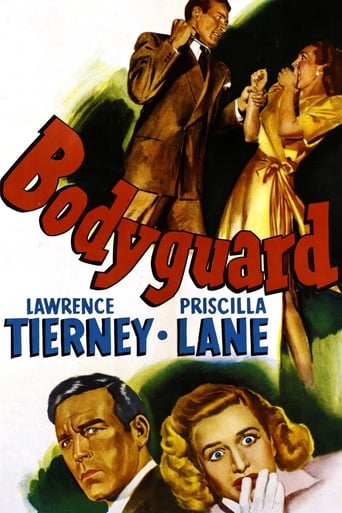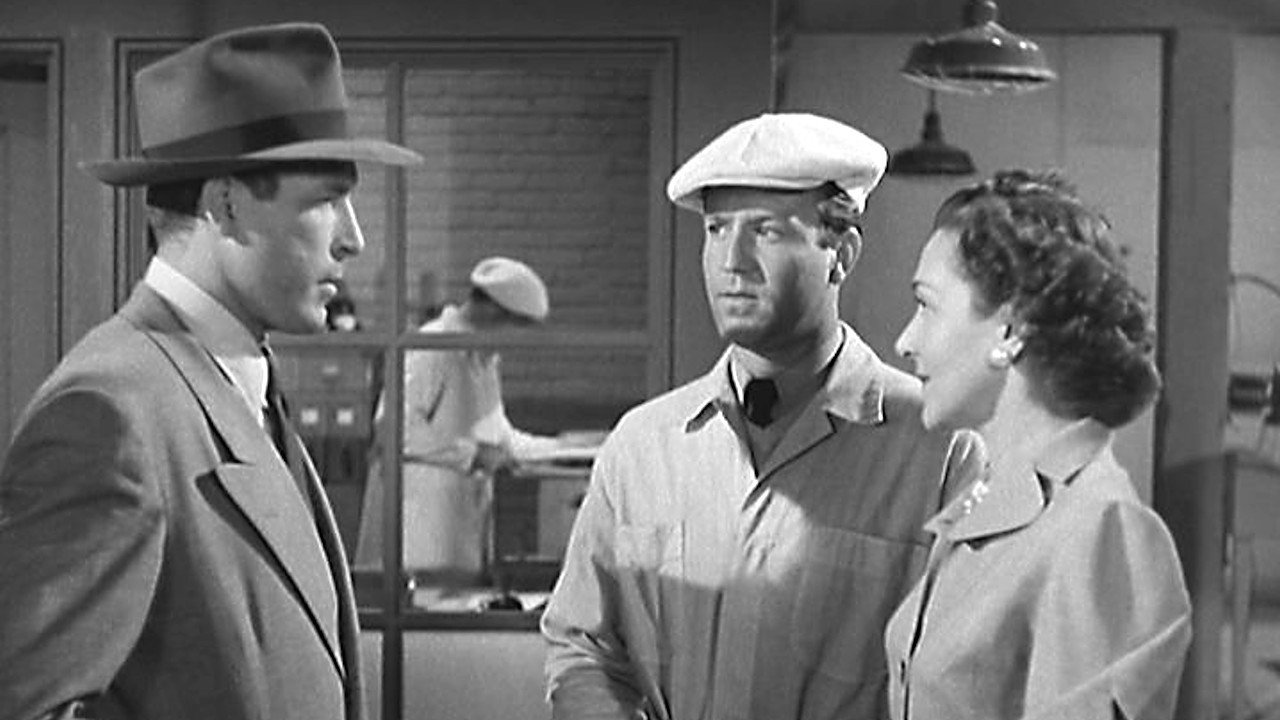mark.waltz
Tough guy Lawrence Tierney portrays a disgruntled and dishonored cop who finds menial work as a bodyguard, and ends up wanted for murder! Becoming tied in with corruption at wealthy widow Elisabeth Risdon's meat factory, putting up with her abuse and nasty assistants, and fighting other criminal elements in his efforts to clear himself. Post war cynicism and big business apathy play a large role in getting this complex story off the ground with a psychological darkness that truly reflects the downward turn in society after a war that had briefly united the entire free world. This tight, short film noir is one of those unique ones that is almost in a class by itself. It's dark even when the lights are on, and really tests the limit of the code with violence, anger and ugliness. Priscilla Lane exits the sweetness of the four daughters as Tierney's girlfriend who finds herself in danger in her efforts to find the real killer. This is where the camera takes over, almost becoming a character, showing the intensity of audience emotion, the fear in Lane's eyes as she is closed in, and the evil inside the killer's soul as they target Lane's vulnerable mouse like a ravenous cat. The moody tension outweighs the predictability to where clichés are practically ignored and gives the audience moderate satisfaction at the conclusion.
Brian Camp
BODYGUARD (1948) is a snappy 62-min. b&w noir programmer directed by Richard Fleischer and starring Lawrence Tierney. Rather than repeat what others have said here, I'd rather emphasize a couple of things that truly distinguish this film. For one thing, it was filmed largely on location at sites all over Los Angeles. Ex-policeman Mike Carter (Lawrence Tierney), trying to clear himself of a false murder charge, moves around L.A. quite vigorously in the course of his investigation, sometimes by car, sometimes by cab, and sometimes on foot, traveling to shops, offices, back alleys, factories, piers, and amusement arcades all over the city. If you like seeing film footage of L.A. in the 1940s, there are many films with abundant footage, but none quite like this one.Also, I'd like to single out a very clever scene that offers an ingenious method of transmitting key information from one location to another in the era before fax machines, cell phones, or e-mail. Carter needs the contents of a case file kept by the police officer whose murder he's been framed for. Only his girlfriend, Doris (Priscilla Lane), who works in the department, can find the file for him. He tells her over the phone to write down all the important cases handled by the officer in the past year and then go to an amusement arcade on 3rd Street, find a "Record Your Own Voice" booth and read all the cases into the microphone onto as many vinyl records (78 rpm) as needed, and then to leave the stack of records for him at the cashier's counter under an assumed name. Carter's plan is to go to the arcade, give the assumed name, enter an available booth and listen to the records until he finds the case he's looking for. There are wonderful little details of character and street life woven into the scene (and just about every scene in the movie). When Carter first enters the arcade, the brassy blonde at the counter is flirting with two sailors and claims not to know anything about a stack of records for a "Mr. Nolan." An anxious Carter gets insistent and the two sailors turn on him, spoiling for a fight. Only then does the manager come over and defuse the situation and find the package of records for Carter. It's just a brief moment but it not only adds to the suspense, but captures so much of the tenor of the time and place.The basic plot itself—corrupt industrialist covers up shady business practices via murder and convenient frame-ups—would get recycled ad infinitum on TV cop shows in the 1970s. But it might have seemed somewhat fresh back in 1948, especially after ALL MY SONS (also 1948), based on Arthur Miller's play, raised a similar issue in a drama of a wartime industrialist who sends out defective airplane parts with tragic results.
HEFILM
Because the formula of the movie required (and restricted) what the film would/could have in it. This is a well made fast paced movie with flashes of effective style and some novel touches. Like the following: The "boss" of the meat packing business, the character that requires a bodyguard, is an older woman for instance. And the setting of a conspiracy at a meat packing plant is also kind of novel. The set up with the angry cop getting tossed off the force has a nice pay off in the plot. There are some effective shock moments in the film too though most of these are in the first half.But what's missing, and not "required" from a B picture in much real drama. It's by the numbers without anything other than those numbers being hit. There seems to be no real emotions at stake for the characters. Good guys, Good gals, bad guys fill in their zone of the script without becoming, or allowed to become, real people who have real lives at stake. This doesn't become the existential nightmare for the lead bodyguard or the Kafkaesque descent of the outsider tosses into darkness that the great noirs sometimes achieve. The actors could be partially faulted for this, Tierney is so tough that he never stops to be really concerned about his own fate or anyone Else's. There is a good element of mystery as to who the real villain is. But what that this does is keep the film from having any real menace. And what the villain or villains do isn't gripping enough, frequently enough, to keep any sense of suspense of danger to the proceedings. It's a puzzle the main character must solve--not much more. Rumors of a longer cut? Never heard those rumors before the IMDb. Though the "remaining" movie doesn't feel like it's missing anything--other than a deeper script. The style of the direction hints at deeper darker things but that's not in the program so to speak. It's very good for what it is allowed to be, or "B" if you prefer. Plot, Action, style-no resonance or deeper secrets allowed.
FilmFlaneur
Made in 1948, Bodyguard' is the first of several effective and taut noir B-thrillers made by Richard Fleischer at the start of his career. Follow Me Quietly' and Clay Pigeon' came next, (both 1949) and finally, with increasing assurance, Armored Car Robbery' (1950) and The Narrow Margin (1952). There's a comparison to be made here between Fleischer's work and that of his contemporary Anthony Mann. Starting with Desperate' (1947) Mann founded his own directorial reputation on several effective B-thrillers around the same time, work now highly regarded among fans. Fleischer's films, though sharing many of the same qualities, are relatively less well known and await discovery. While in the 50's Mann went on to direct a great series of Westerns with James Stewart such as Naked Spur' and then to the quality epic El Cid', Fleischer's later career was workman-like, entertaining, if generally unexceptional.Bodyguard' apparently exists in two version. There's a 75 minute director's cut' out there somewhere. The one discussed here is the original 62 minute release. I suspect that most of those missing minutes might have disappeared from the potentially gruesome meat factory finale. These are scenes which feel slightly abbreviated, but generally continuity and plot seem unimpaired from any trimming. As the then unknown Robert Altman co-wrote the screen play, it would be interesting to see what has been excised.At the heat of the film is ex-homicide detective Mike Carter, played with stoney-eyed, rigid-backed conviction by Lawrence Tierney. The plot is the old one of the hero framed by the real villains to throw the law off their scent, and of his attempts to clear his name while on the run. Tierney (who also appeared in Reservoir Dogs' (1992) - no doubt chosen by Tarantino because of his minor noir-iconic status) had just appeared in one of the great films of the genre, Wise's Born to Kill/Lady of Deceit' (1947) when he was cast next in Bodyguard'. A legendary real life tough guy, his brawling presence dominates proceedings. As an actor he had the ability to project a dead calm, scowling brutalness - ideal for noir, a characteristic he showed beyond doubt as a superb Dillinger in the movie of the same name (1945). In the present film he is a cop at the outset, but soon loses his job after fighting with his boss - in effect turning into a private detective. Although he is hired as a `bodyguard', Carter's semi-official investigative powers, his struggle to clear his name after he is framed, as well as the pervading air of conspiracy and persecution place this clearly in noir territory. Ultimately Carter ends up protecting his own body from the manhunt and killers, rather than that of his client.The noir style frequently brought out the best in directors of all abilities. The shooting requirements of the genre (shadow, cheap sets, anonymous location and so on) made a virtue out of low budgets. Fleischer's tough film is punctuated with some particularly effective scenes. At one point Carter is led by evidence to an opticians office. Himself seated in an examination chair for a check up, Carter quizzes the nervous eye doctor. As he questions his suspect, Carter's eye fills the screen in dramatic close up, his iris contracting under the light. The view is disconcerting as it reveals the ex-cop under a microscope, as it were, while the emotionless hard-boiled dialogue continues over the image. We are as close to the man as we can get, but his language reveals nothing.A would-be attacker is reflected in a mirror, and a swift struggle ensues. Carter brutally subdues both men, then both he and girlfriend bluff their way past an arriving policeman to escape. There's tension, pacing and originality of staging here, enough to do justice to a bigger crime picture. Mirrors have already played a part in the plot: earlier, with calm professionalism, Carter deduced why an assassin's bullet missed Gene Dyson. The killer, he decides, had mistaken the old lady's reflection for the real thing. Later in the plot, the near perfect sight of the murdered meat inspector is the fact upon which the case ultimately turns. The equation of seeing' with comprehension' - a common conceit in noir - falls into place discreetly, without strain.The biggest weakness of the film is the relationship between Carter and his girlfriend. Too often a compliant and docile investigative companion, and too quick to put up with the rigours involved, she lacks strength and individuality. When Carter rushes to her assistance at the end of the film (a setting reminiscent of the meat-packing plant robbery of Gun Crazy' filmed two years later) one feels she has served her only necessary purpose apart from lazily filling out his home life. With the luxury of a longer running time, she might have added another dimension to the hero. She is reduced to a plot device, a noir damsel in distress.Bodyguard' is well worth seeking out among more obscure noirs. There are better films but the non-nonsense strengths of this production, as well as the pleasure of seeing Tierney playing a star role make it enjoyable.


 AD
AD



